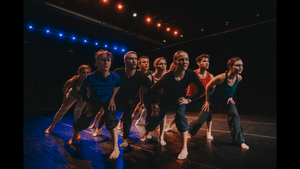Stay in the Loop
BSR publishes on a weekly schedule, with an email newsletter every Wednesday and Thursday morning. There’s no paywall, and subscribing is always free.
Where the journey home stands 25 years later
Koresh Dance Company presents Ronen Koresh’s Aftershock

Founder and choreographer Ronen (Roni) Koresh brings his Koresh Dance Company to FringeArts November 10 through 12 for three performances of his 2015 Aftershock, reflecting on his experience as an Israeli immigrant. The intimate space seems particularly well-suited to such a personal story.
Where is home now?
On a recent visit to the studio, Koresh chatted between run-throughs of the dances that make up the full-length piece. Of the impassioned duet, set to Middle Eastern music, represents the beginning, he said, “Where I came from—Israel, a war-torn country. And then me, moving to a new place, always new.” Like so many immigrants, Koresh left his home to follow his dreams in the United States. It was the 1980s, and his 1995 Culture Shock reflected that tumultuous time. Aftershock is a bookend of sorts, created 25 years later to look back on his journey and examine where he is now.
The trio that rehearsed next took us further along that journey. Owen Whetstone, representing Koresh himself, is torn between his two loves: Israel and the United States (danced by Paige Devitt and Savanna Mitchel). “Change,” Whetstone called out, moving from one to the other, and Koresh explained, “You have to choose, so change is coming.” Part of what drives the piece is the realization that he still loves Israel, “the place I come from, my mother tongue.” But after all these years, he is an American now—even his mannerisms have become American.
Koresh said the piece will appear much as the company performed it in 2015, but he returned to it with new eyes. “It’s like Israel, when I go to visit. All the memories, the smells, the food, the laughter and the joy, the heat, the sense of everything.” He grew up poor as a Yemeni Jew in Israel, he said, but it wasn’t until he returned on a visit 10 years ago that he recognized it as a desert with cactuses and tumbleweed and cracks in the earth. As a child, he never saw it; he just lived. Now, he brings a deeper understanding to his own life. It is the same with the piece—understanding your own work takes time.
Courageous points of view
I wondered why he chose to bring the piece back now, and Koresh talked about immigration. “I look at what’s happening globally right now; it’s so frightening, and I think it’s extremely important to see it from the human point of view.” For him, the company is an ambassador for Philadelphia, and he says, “We represent something that is quite beautiful and inspirational, all over the world, and it says something about Philadelphia, it says something about the arts.” At the same time, as an Israeli, he wants to show audiences “the contribution that we give to the world.” It might even be a little dangerous right now, he says, but artists have never feared: “We are always at the front lines of expression.”
The last of the dances I saw in rehearsal was serendipitous. Koresh put on the music to the “Whiplash” section, starting with spoken word: “After all is said and done, the biggest shock of all is who we really are.” (He is working again with poet Karl Mullen, also an immigrant but from Dublin). The dancers, resting at one end of the room, began to do the arm movements for the piece, and Koresh laughed and brought them onto the floor to run through the group number. Koresh lived and worked in New York in the 1980s, and the piece is fast and urban, evoking that time with abrupt gestures and street dance movement blended into the contemporary. At the end, he laughed and apologized for dropping them in unaware, but one of the dancers said, “I was willing it to happen.”
Even rehearsed in bits and pieces, the dancing was intense and emotional, though Koresh promises humor as well. At just over an hour, with a five-minute opener by the Koresh Youth Ensemble, it invites audiences to make it an evening with the prix-fixe dinner at the adjoining FringeBar. The company will receive a portion of the dinner price.
Koresh has announced that all proceeds from the Sunday, November 12, show will be donated to the Israeli Children’s Fund.
What, When, Where
Aftershock. Choreography by Ronen Koresh. Koresh Dance Company; presented by FringeArts. $25-$35. November 10-12, 2023, at FringeArts, 140 N Christopher Columbus Boulevard, Philadelphia. (215) 751-0959 or koreshdance.org.
Audience members are invited to make it dinner and a show at the FringeBar. There will be a prix fix menu at $55, with a portion of the price going to the company. fringebarphilly.com.
Accessibility
FringeArts is fully ADA compliant.
Sign up for our newsletter
All of the week's new articles, all in one place. Sign up for the free weekly BSR newsletters, and don't miss a conversation.

 Camille Bacon-Smith
Camille Bacon-Smith